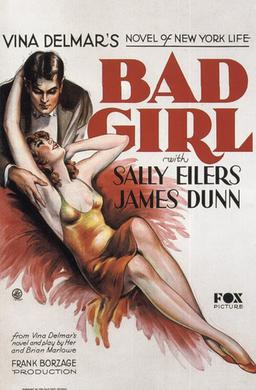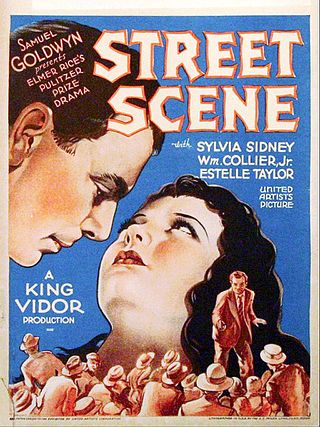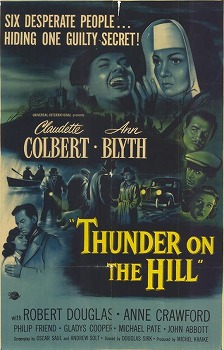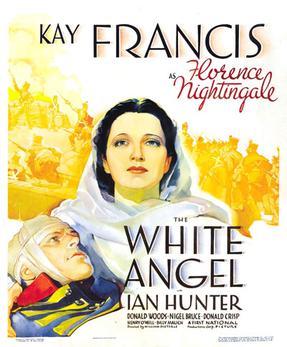
Bad Girl is a 1931 American pre-Code drama film directed by Frank Borzage and starring Sally Eilers, James Dunn, and Minna Gombell. The screenplay was adapted by Edwin J. Burke from the 1928 novel by Viña Delmar and the 1930 play by Delmar and Brian Marlowe. The plot follows the courtship and marriage of two young, working-class people and the misunderstandings that result from their not having learned to trust and communicate with one another. The film propelled then-unknown actors Eilers and Dunn to stardom. It was nominated for three Academy Awards, including Best Picture, and won for Best Director and Best Adapted Screenplay.
The Barrymore family, and the related Drew family, form a British-American acting dynasty which traces its acting roots to the mid-19th century London stage. After migrating across the Atlantic Ocean to the United States, members of the family subsequently appeared in motion pictures, beginning with the silent film period of the 1890s to 1929 and then into the modern era of sound film.

Marie Josephine Hull was an American stage and film actress who also was a director of plays. She had a successful 50-year career on stage while taking some of her better known roles to film. She won an Academy Award for Best Supporting Actress for the movie Harvey (1950), a role she originally played on the Broadway stage. She was sometimes credited as Josephine Sherwood.

Edward Joel Pawley was an American actor of radio, films and Broadway. The full name on his birth certificate is Edward Joel Stone Pawley; he never used the Stone name, which derived from a Stone family in Illinois.

Street Scene is a 1929 American play by Elmer Rice. It opened January 10, 1929, at the Playhouse Theatre in New York City. After a total of 601 performances on Broadway, the production toured the United States and ran for six months in London. The action of the play takes place entirely on the front stoop of a New York City brownstone and in the adjacent street in the early part of the 20th century. It studies the complex daily lives of the people living in the building and the sense of despair that hovers over their interactions. Street Scene received the 1929 Pulitzer Prize for Drama.

These Old Broads is a 2001 American made-for-television comedy film directed by Matthew Diamond, written by Carrie Fisher and Elaine Pope, and starring Fisher's mother Debbie Reynolds, as well as Shirley MacLaine, Joan Collins, and Elizabeth Taylor in her final film role. In a 2001 BBC Omnibus documentary about Taylor, MacLaine says that Julie Andrews and Lauren Bacall were originally planned to be in the film. The role of Miriam Hodges was originally offered to June Allyson, who ended up in a cameo instead. The film premiered on February 12, 2001 on ABC.

Make Way for Tomorrow is a 1937 American tragedy film directed by Leo McCarey. The plot concerns an elderly couple who are forced to separate when they lose their house and none of their five children will take both parents.

Here Comes the Groom is a 1951 American musical romantic comedy film produced and directed by Frank Capra and starring Bing Crosby and Jane Wyman. Based on a story by Robert Riskin and Liam O'Brien, the film is about a foreign correspondent who has five days to win back his former fiancée, or he'll lose the orphans he adopted. Filmed from late November 1950 to January 29, 1951, the film was released in the United States by Paramount Pictures on September 20, 1951.

Street Scene is a 1931 American pre-Code drama film produced by Samuel Goldwyn and directed by King Vidor. With a screenplay by Elmer Rice adapted from his Pulitzer Prize-winning play of the same name, Street Scene takes place on a New York City street from one evening until the following afternoon. Except for one scene which takes place inside a taxi, Vidor shot the entire film on a single set depicting half a city block of house fronts.

Thunder on the Hill is a 1951 American film noir crime film directed by Douglas Sirk and starring Claudette Colbert and Ann Blyth. The picture was made by Universal-International Pictures and produced by Michael Kraike from a screenplay by Oscar Saul and Andrew Solt, based on the play Bonaventure by Charlotte Hastings. The music score was by Hans J. Salter and the cinematography by William H. Daniels.

Little Lord Fauntleroy is a 1936 American drama film based on the 1886 novel of the same name by Frances Hodgson Burnett. The film stars Freddie Bartholomew, Dolores Costello, and C. Aubrey Smith. The first film produced by David O. Selznick's Selznick International Pictures, it was the studio's most profitable film until Gone with the Wind. The film is directed by John Cromwell.

Minna Marie Gombell was an American stage and film actress.

The White Angel is a 1936 American historical drama film directed by William Dieterle and starring Kay Francis, Ian Hunter and Donald Woods. The film depicts Florence Nightingale's pioneering work in nursing during the Crimean War. It was produced and distributed by Hollywood studio Warner Brothers.

William Collier Sr., born William Morenus, was an American writer, director and actor.

Miss Pacific Fleet is a 1935 American comedy film directed by Ray Enright. The film stars Joan Blondell, Glenda Farrell, and Hugh Herbert. The film was based on the short story of the same name by Frederick Hazlitt Brennan in the Collier's magazine. It was released by Warner Bros. on December 14, 1935. Two stranded showgirls in California enter a beauty contest "Miss Pacific Fleet" to win the fare back home to New York City.
Minna Stern, known professionally as Hermine Sterler, was a German-American actress whose career spanned both the silent and the talkie film eras on two continents.

Lucille Times was an American civil rights activist. She was active in the struggle for civil rights in Montgomery, Alabama throughout her adult life. Times worked for the cause at a time when the city was at the center of the national movement.

Thieves Fall Out is a 1941 American comedy film directed by Ray Enright and starring Eddie Albert and Joan Leslie, with Jane Darwell, Alan Hale, Sr., William T. Orr, and John Litel in support. Written by Charles Grayson and Ben Markson, the B-film was released by Warner Bros. on May 3, 1941.

Careless Lady is a 1932 pre-Code American comedy film directed by Kenneth MacKenna and written by Guy Bolton. The film stars Joan Bennett, John Boles, Minna Gombell, Weldon Heyburn, Nora Lane and Raul Roulien. The film was released on April 3, 1932, by Fox Film Corporation.

Stepping Sisters is a 1932 American pre-Code comedy film directed by Seymour Felix and starring Louise Dresser, Minna Gombell and Jobyna Howland.


















